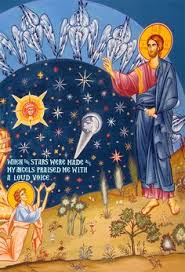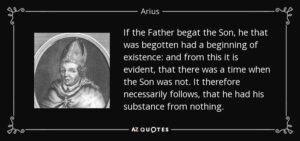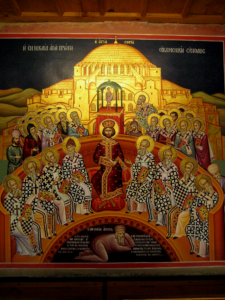Why have I titled this post “The Fathers” of the First Ecumenical Council? Because the Orthodox Church, in her personal approach to everything, titles her commemorations not after events but after the people in them. I like that.
The Fathers of the First Ecumenical Council dealt with many matters: the date of Pascha (why does this keep coming up generation after generation?), the Meletian schism, regulations for the clergy and much more. But here we’re going to talk only about the big issue: the Arian heresy.
What led up to the Council: Arius’ confusion
This story really began one day in the year 319. At a clergy meeting Pope Alexander of Alexandria was speaking of the eternal divinity of Jesus Christ, when he was interrupted by a priest Arius who said (this is not a quote): No, the Bible says the Son is begotten of the Father; therefore the Son had a beginning. He was created by the Father. The Son is not divine like the Father because (and this became the Arian theme song) “there was a time when the Son was not”.
Now it is possible that Arius began simply by misunderstanding the meaning of divinity. Perhaps he didn’t see that to be divine, to be God means to be eternal, to exist outside time – which means if Christ is God, he could not have been created. The Scriptures are clear about this: Hebrews 1:10, speaking of Christ, says “In the beginning, Lord, you laid the foundations of the earth, an d the heavens are the work of your hands.” That is, Christ our God created all things including time. In the Gospel according to Saint John 17:5, Jesus prays, “Father, glorify me together with yourself with the glory which I had with you before the world was”. There never was a time when Christ was not. Granted, there is also a certain subservience of Christ to the Father: In the Garden he prayed “Father, not my will but thine be one.” John 3:16, for example, says he is begotten of the Father – whatever that means. This is all beyond our ken. I think it was Saint John of Damascus who wrote (I paraphrase) that we believe Christ is begotten of the Father, and the Spirit proceeds from the Father, but as to what “begotten” and “proceed” mean, we have no idea. As my old Methodist theology professor (a believer) said, “We do well not to inquire too closely into the family life of God.” But this much is clear: We cannot say “there was a time when the Son was not”. To call Christ the Son of the Father has never meant that he is younger than the Father. It means that, as a human son is human just as his father is human, so the Son of God is God just as his Father is God. In other words, he is of the same “essence”, same “nature” as God his Father.
d the heavens are the work of your hands.” That is, Christ our God created all things including time. In the Gospel according to Saint John 17:5, Jesus prays, “Father, glorify me together with yourself with the glory which I had with you before the world was”. There never was a time when Christ was not. Granted, there is also a certain subservience of Christ to the Father: In the Garden he prayed “Father, not my will but thine be one.” John 3:16, for example, says he is begotten of the Father – whatever that means. This is all beyond our ken. I think it was Saint John of Damascus who wrote (I paraphrase) that we believe Christ is begotten of the Father, and the Spirit proceeds from the Father, but as to what “begotten” and “proceed” mean, we have no idea. As my old Methodist theology professor (a believer) said, “We do well not to inquire too closely into the family life of God.” But this much is clear: We cannot say “there was a time when the Son was not”. To call Christ the Son of the Father has never meant that he is younger than the Father. It means that, as a human son is human just as his father is human, so the Son of God is God just as his Father is God. In other words, he is of the same “essence”, same “nature” as God his Father.
Therefore, the New Testament speaks clearly of the divinity of Christ: Saint John began his Gospel with “In the beginning was the Word, and the Word was with God, and the Word was God.” The Apostle Thomas saw the risen Lord and cried, “My Lord and my God”. (John 20:26) Saint Paul proclaimed that Christ has equality with God. (Philippians 2:6) There is much more. Passage after passage make sense only if Jesus is divine. If he is not God, his claim that “all authority in heaven and earth has been given to me” (Matthew 28:18) is idolatry. Or craziness.
My point in restating these familiar texts is just to point out that Arius was clearly wrong. He wasn’t reading the New Testament right. He was like some people throughout history (the world is full of them right now) who have run off with Scripture passages out of context, contrary to the rest of the Bible, contrary to the Tradition of the Church, and have tried to make them mean what they do not mean.
In the early centuries the divinity of Christ seemed obvious; it was his humanity that some questioned. Arius’ denial of Jesus’ divinity was a new idea and a dangerous one. It threatened our salvation. If Christ is not God how do his teachings have divine authority? He becomes only one more human teacher like Mohammed or the Buddha. If Jesus is not God, his crucifixion is no longer the ultimate sign of God’s love for us; his resurrection is not God’s victory over the worst the devil and mankind can do. If Christ is not both God and Man how can he unite mankind with God, unite heaven and earth in himself? If Jesus Christ is not God and Man the whole Gospel, the “Good News” of our salvation goes out the window. The Church had always seen it this way. Arius had it wrong.
What caused the Council: the Arian heresy
So Pope Alexander pointed all this out. Arius refused the back down. He got his back up. This is the mark of the heretic. I once heard Father Thomas Hopko say that a heretic is not just anyone with a false opinion. Who among us perfectly understands the Orthodox faith? We all get confused sometimes. All the saints, even the Fathers, have made theological errors. However, they submitted their opinions to the Church, to the Tradition, and when it was made clear to them why they were wrong they said, “Sorry, I see my mistake” and then changed their minds and got with the Church. But the heretic, when his or her errors are pointed out, says, “No, the Church is wrong, the Tradition is wrong, the Bible is wrong, and I am right.”
(I repeat here my plea: If I mistakenly write anything un-Orthodox, inaccurate, uncharitable or just stupid, please correct me.)
 Arius wouldn’t give it up. He started to promote his doctrine which became known as Arianism, and to do so I’m sorry to tell you that he appears to have invented the singing commercial. (I think this was almost as bad as being a heretic! It has led to today’s world where we forever catch ourselves humming mindless ditties designed to make us buy stuff we don’t need or even want.) Arius put his doctrines to music and sent pop musicians out to teach people the songs so they would remember: “The uncreated God has made the Son the first of all things created… the Son is not equal to the Father nor does he share the same essence… there was a time when the Son was not… the members of the Holy Trinity share unequal glories.” (Well, you had to be there…) But Arius knew what modern advertisers and politicians know: that people rarely ask Is this true? Does it make sense? So if you just say it often enough in a way people can remember, then no matter how false or off the wall it is, many will come to believe it. It works. Look at today’s world. Look at the ancient world, where Arianism began to take hold and grow, first in Egypt and then throughout the East. The Church had experienced plenty of persecution from outside, but Arius was the first of the “savage wolves”, predicted by Saint Paul in Acts 20, who set out to ravage the Church from the inside.
Arius wouldn’t give it up. He started to promote his doctrine which became known as Arianism, and to do so I’m sorry to tell you that he appears to have invented the singing commercial. (I think this was almost as bad as being a heretic! It has led to today’s world where we forever catch ourselves humming mindless ditties designed to make us buy stuff we don’t need or even want.) Arius put his doctrines to music and sent pop musicians out to teach people the songs so they would remember: “The uncreated God has made the Son the first of all things created… the Son is not equal to the Father nor does he share the same essence… there was a time when the Son was not… the members of the Holy Trinity share unequal glories.” (Well, you had to be there…) But Arius knew what modern advertisers and politicians know: that people rarely ask Is this true? Does it make sense? So if you just say it often enough in a way people can remember, then no matter how false or off the wall it is, many will come to believe it. It works. Look at today’s world. Look at the ancient world, where Arianism began to take hold and grow, first in Egypt and then throughout the East. The Church had experienced plenty of persecution from outside, but Arius was the first of the “savage wolves”, predicted by Saint Paul in Acts 20, who set out to ravage the Church from the inside.
Emperor Constantine comes to the rescue
 Now, this was a problem and not only for the Church. As you heard in last week’s Blog post, the new Emperor Constantine favored Christianity and intended the empire to be united in the Christian faith. But now Christians were divided. Constantine was getting letters from irate Christians both Orthodox and Arian fuming at each other, begging him to suppress their opponents. This wouldn’t do
Now, this was a problem and not only for the Church. As you heard in last week’s Blog post, the new Emperor Constantine favored Christianity and intended the empire to be united in the Christian faith. But now Christians were divided. Constantine was getting letters from irate Christians both Orthodox and Arian fuming at each other, begging him to suppress their opponents. This wouldn’t do
JJensen, GNU Free Documentation License
So Constantine took it upon himself to unite the Church. He invited all bishops to a Council to be held in the city of Nicaea in western Asia Minor, not far from where his new capitol, later titled Constantinople, would soon be built.
Remember, it was scarcely a decade since the Great Persecution had ended. The bishops could scarcely comprehend that a Christian Emperor now sat on the throne and cared about the unity of the Church. 1800 bishops were invited but it is said only 318 attended, 6 from the west, 312 from the east. With their accompanying priests, deacons and other assistants, perhaps as many as 1800 people were gathered.
I quote here and (as I told you last week) I draw off and on throughout this article from the book The Holy Fire: The Story of the Fathers of the Eastern Church by Robert Payne, a readable introduction to the subject:
“From the east came bishops who had suffered persecution… Paul, Bishop of Mesopotamian Caesarea, with his hands scorched in the flames. Paphnutius of Upper Egypt, famous for the austerity of his life, had had his right eye dug out and the sinews of his left leg…cut during the Diocletian persecution. Bishop Potammon of Heraclea who had lived in the deserts of the Nile had also lost an eye… James Bishop of Nisibis who wore a coat of camel’s hair, and from the island of Cyprus Bishop Spyridon a saintly shepherd who refused to give up tending sheep even when he was elevated to the episcopate, a man who performed miracles to the delight of Cypriotes… John Bishop of Persia and Metropolitan of India from the lands outside the empire, and from the unknown north came Theophilus the Goth a flaxen haired Scythian from somewhere in Russia. There were sharp-featured intellectuals, men of abstruse book learning capable of splitting hairs by the yard,… wise old hermits who had spent the previous year clothed in rough goat hair cloaks living on roots and leaves. There were men so saintly that it was almost expected…that they would perform miracles. There were cantankerous men and men riddled with heresies and men…in hope of preferment from the emperor, …men who came peacefully and other men determined to wage war.”
And now it was time for the First Ecumenical Council to begin.
Next Week: Part 2 – What the Council was like and what it accomplished
